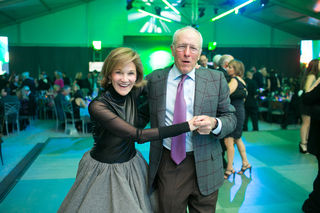Depression
Walking the Walk of Mental Illness
I suffer a relapse of my depression for the first time in 8 years.
Posted March 3, 2016
On January 29, 2016, my friend Rusty Rose lost his three-decade long battle with depression. On that same morning, I sat in a locked psychiatric ward at Zale Lisphy at UT Southwestern (UTSW) waiting for my first session of electroconvulsive therapy (ECT) in eight years. This relapse into depression followed the precise pattern of my major depressive episodes in 1979, 2001 and 2007. In 2016, as in years past, ECT proved to be the treatment I needed to put my life back on course.
In early January of 2016, I knew my depression had returned. I wrote an article about my relapse that I planned to publish on Psychology Today, but didn’t. I have published that article, “Beating the January Blues” on my Struck by Living website. Why didn’t I publish it on Psychology Today? Mental illness is an easy topic to me as long as it is something in my past, or something that afflicts someone else. While in the pit of my illness this year, I felt certain I’d end up like Rusty.

Rusty and I had an odd friendship that centered on depression and a shared love of birds and baseball. I’m closer friends with his wife Deedie, Dallas’ powerhouse philanthropist whose sense of style and steely perseverance has converted many of us to fervent supporters of the arts in our city. Deedie and Rusty guided my husband Ken through the quagmire of the mental health system in 2001, ensuring I received the care that saved my life, ECT. Deedie read countless drafts of my book, Struck by Living. She introduced me to my mentor Tom Johnson, who acted as my cheerleader through eight years of drafts before publication of the book in 2010.
What most people don’t know, is that Rusty and I typically talked only when one or the other of us was depressed. In 2001, he assured me I would make my way out. Rusty never published a book or went on a speaking tour about his depression as I did, but he helped anyone who asked. He did this quietly, one life righted at a time. He had no patience for the fickle limelight of media.
In 2005, I convinced him that ECT might be helpful for him, and it was. Then in 2007, Rusty convinced me that ECT would, again, help me recover. This is the strange thing about depression. Even though ECT worked miraculously for me in 2001, I doubted it would work again. In 2007, I did not allow my depression to reach the point of suicide attempts as I had in 2001. Luckily, all my friends and family had read the drafts of my book. They had an outline of my symptoms and knew exactly what worked for me: ECT. I had ECT again, immediately recovered and, by developing a Top Ten plan for wellness that worked for me, I remained well and vibrant for 8 years.
My last one-on-one discussion with Rusty was on January 9, 2015. I had agreed to be interviewed for an article for the Dallas Morning News, which had been published in December of 2014. While the information about UTSW and me was well written and accurate, the journalist had chosen to present an opposing view for a “balanced” article. The problem with medical reporting in journalism is that balanced reporting has nothing to do with proportion or results. If one person in 100 has a horrific result, both the positive and negative results are presented equally.

I was furious at the Dallas Morning News, and had written the paper with unsatisfactory results. Every time I write about ECT, an enormous amount of my time is spent fending off the unhappy folks who dislike ECT and those who lobby the FDA to have it banned or severely limited. You can look at past blogs I have written about ECT, littered with negative comments from those who have had a bad result. If I retort or delete these comments, the anti-ECT crew screams that I am denying their free speech. Now, I simply let the comments stand and ignore them. I asked Rusty if I should battle the Dallas Morning News and the anti-ECT collective. As always, Rusty’s advice was sage and succinct: Don’t waste your time.
Instead, he encouraged me to pursue the other idea we discussed that day, a center for depression research and clinical care at UT Southwestern. I followed Rusty’s advice, and in spring of 2015, The Center of Depression Research and Clinical Care at UT Southwestern came into being. Both Rusty and I agreed that early detection and early intervention is the only way we will get ahead of mental illness. Today, we lack the equivalent of a mammogram for mental health. Instead, we often treat depression or bipolar disease as the equivalent of a Stage 4 cancer. Unsurprisingly, the results are dismal. About 41,000 people die annually by suicide in our country, about as many as by breast cancer.
The Center for Depression Research and Clinical Care at UT Southwestern focuses on partnering with existing primary care physicians. The practices routinely screen all patients for depression and measure their progress at every appointment using a program called VitalSign6. Currently, 19 Primary Care clinics use VitalSign6 and over 18,000 patients have been screened. The powerful news is the primary care clinicians are now actually able to better detect and treat depression in its early stages, referring fewer and only the more critical patients to psychiatrists. Dr. Madhukar Trivedi, Director of the Center for Depression Research and Clinical Care feels the primary care provider is key to early detection. “VitalSign6 provides primary care physicians an easy-to-use measurement-based approach to treat depression,” Trivedi says. “Just like diabetes care or heart disease – early recognition with early intervention leads to better results."
I knew Rusty was struggling from depression this past year. Deedie knows an immense amount about mental health care from years of caring for Rusty and serving on the board of The Meadows Mental Health Policy Institute. I didn't call or contact Rusty because I knew Deedie knew which experts to contact. I assumed my phone call would not matter. What I failed to remember is that sometimes a call from a person who has made it out of the pit makes all the difference. Unfortunately, for the first time, Rusty and I happened to stumble into the pit at the same time.
When I saw Deedie on January 13, 2016 in a meeting about the Dallas Theater Center, I knew things were bad. I am Chair of the Board of the Dallas Theater Center, a board Deedie convinced me to join. Deedie and I often talk about the sad state of mental health care in our country, trying to construct ways to make it better. We support each other’s work in mental health and in the arts. I offered Deedie my contacts, but did not offer to call Rusty directly. I was stretched thin, struggling with my own issues. I did not proactively pick up the phone to call Rusty. This will be one of my life’s regrets. My guess is that phone call might have helped both of us.
When Jeff Woodward, Managing Director of the Dallas Theater Center, called me on January 29th to let me know about Rusty’s death, my first thought was, "I get it." I'd had my first session of ECT that morning, and would need a few more sessions of the procedure to see results. I had just spent two days in a locked psychiatric ward, the process humiliating and degrading despite the fact that everyone at UTSW treated me with kindness. "If this disease hits me again at age 74, and if the process is the same as it is today and if I have access to a gun," I thought, "I will absolutely pull the trigger."
I was still deeply depressed and certain ECT would not work. In retrospect, this seems irrational, but this is how depression works. Despite the fact that ECT had worked powerfully for me in 2001 and 2007, and my husband and friends assured me that I sounded exactly like I did in those past depressive episodes, my depressed brain knew ECT would not work for me. I made a deal with myself. On the chance that my husband, friends and the professionals were right, I agreed to give the process 10 days. If I still felt the same way in 10 days, I could reevaluate the situation. As I went under anesthesia February 1, 2016, the day of Rusty’s funeral, I thought to myself, "Perhaps I will get lucky and die under anesthesia." I didn’t.

After three sessions of ECT and less than a week after I set my self-made deal, my depression lifted. As in 2001 and 2007, there have been some short-term memory issues, but even as I am now a few weeks after my last treatment, those issues are fewer and fewer. This time, as in the past, the more I use my brain, the faster my brain seems to recover and rewire. Just as a patient needs some time to recover after heart surgery, I need a little time to rewire after ECT. The alternative, months of debilitating depression and risk of suicide, was not one I was willing to chance.
Last week, as I held my first board meeting at Dallas Theater Center after receiving ECT, I decided a moment of silence for Rusty Rose was not enough. Some of the people on the board and at the theater knew about my relapse, but I had not told everyone. Again, despite all the lectures I’ve given about how we all need to be more open about mental illness, I didn’t want people to think I was crazy, or could somehow hurt the institution I love so much.
Instead, I called Jeff Woodward on the day of the board meeting and told him that I’d be a hypocrite if I refused to tell my story. I gave him the option of letting me resign as chair. He asked to have five minutes to confer with Kevin Moriarity, Artistic Director of the Dallas Theater Center. He called back with a clear message from both of them: Go for it. This is who you are.
Neither of these men asked for a script of what I might say. I brought along copies of books that have been immensely valuable to me recently, Rick Hanson’s Buddha’s Brain and Just One Thing. I also brought copies of my Top Ten Wellness List available as well as my books Struck by Living and Decidí Vivir for the taking. Furthermore, I insisted that we break the silence about mental illness by talking more openly with each other. Our support system is often sitting right next to us, to our right and to our left, but we suffer in silence instead.
Did the board vote for me to resign? No way. The hugs and support I received were overwhelming. I don’t know why I was surprised; this has been my consistent experience when I tell my story. I just need to dare to tell it.
Once again, ECT worked miraculously for me in a short period of time. Am I cured? No. Depression is a chronic disease that requires a watchful eye and self-care. However, my depression is in remission and I’ve regained my passion for life. I’m deeply appreciative of my husband, family, friends, the Dallas Theater Center employees and board, my psychotherapist and the professionals at UTSW who have allowed me to regain my life and move forward.
Other Information that May Be of Interest:
The Meadows Mental Health Policy Institute has just launched the Okay to Say campaign to encourage people to talk openly about mental illness. You can record your story at this link. I plan to record mine next week and send it in.
You can find out more about Julie K. Hersh, Struck by Living or Decidí Vivir on her website.




